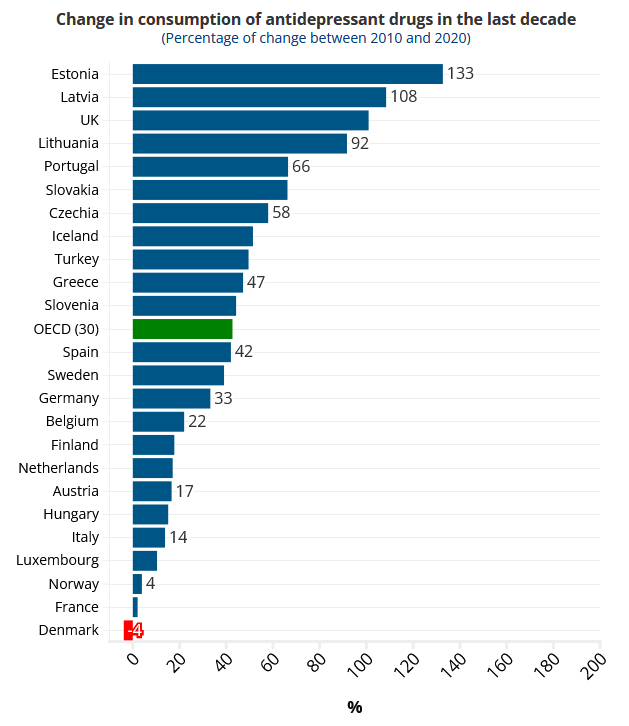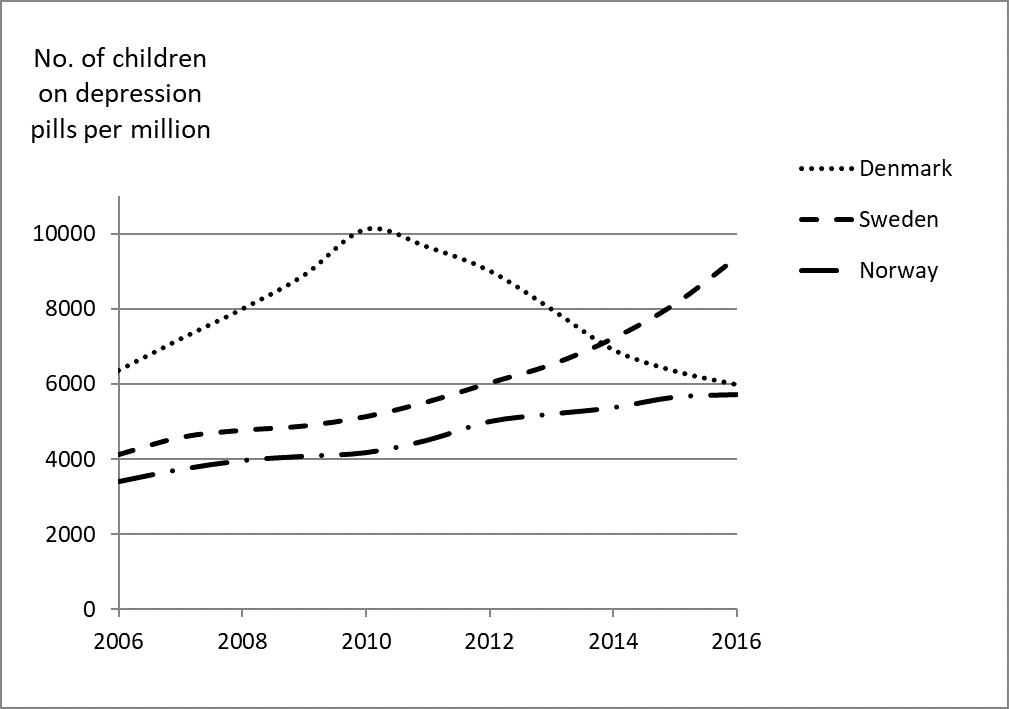Between 2010 and 2020, the consumption of depression pills increased by 37% in 24 European countries. Denmark was the only country where usage dropped (a 4% drop):

For children, the drop in use in Denmark has been much bigger, a 41% drop in only six years between 2010 and 2016. In Norway and Sweden, usage went up by 40% and 82%, respectively, in the same time period:

So, what happened in Denmark? Due to concerns about the suicide risk, the Danish National Board of Health reminded family doctors in the summer of 2011 that they should not write prescriptions for depression pills for children, which was a task for psychiatrists.
At the same time, I began to warn strongly against the suicide risk of the pills. I repeated my warnings countless times in the following years on radio and TV, and in articles, books, and lectures. It started with an interview with the managing director of Lundbeck who, in 2011, claimed that depression pills protect children against suicide. The interview took place while Lundbeck’s US partner, Forest Laboratories, was negotiating compensation with 54 families whose children had committed or attempted suicide under the influence of Lundbeck’s depression pills. I have described Lundbeck’s irresponsible behaviour in my 2015 psychiatry book.
The huge drop in usage among children occurred against all odds. Even though depression pills cause suicide, indeed at all ages, leading professors of psychiatry in Denmark continued to propagate their false claims that depression pills protect children against suicide, which they continued claiming also after 2016.
The Danish National Board of Health had issued several warnings against using depression pills to children before 2011. Furthermore, official warnings from authorities have very little impact on prescribing. The average reduction in prescribing is 6%, and interviews with doctors suggest limited awareness, uptake, and at times belief in these warnings. This is exactly the case with depression pills and children. Key opinion leaders among doctors generally do not believe in the warnings; they believe that depression pills protect against suicide, a belief which they propagate everywhere, in scientific articles, in the media and in lectures. This erroneous belief is lethal.
I am therefore convinced that it is primarily due to my tenacity that the usage went down in Denmark. I say this to encourage people to fight for a good cause, which is that depression pills should not be used by anyone. As I have explained in my Critical Psychiatry Textbook, which will soon be serialised on Mad in America, it is indisputable that depression pills do much more harm than good. Since doctors cannot handle them, they should be taken off the market.












Peter,
“…I am therefore convinced that it is primarily due to my tenacity that the usage went down in Denmark…” I was just thinking this as I was reading.
I took antidepressants in the 1980s – and they had no emotional effects – which is what most people I’ve met have said about them.
I didn’t consider antidepressants to be toxic in the 1980s, but I would consider them to be toxic now.
Report comment
I wrote in to Doctors, The Irish Medical Council and many other places in 2012 /2013 regarding the lethal effects of the Neuroleptic Drug Modecate, (Fluphenazine) which is on the WHO list of Essential Medicines – and which nearly killed me several times.
I notice in 2013 that Fluphenazine was “mysteriously” taken off the market in the US.
I came off this deadly drug in 1984, replacing it with straightforward stress management techniques, to become independent of Psychiatry.
(The whole thing is a Fraud)
Report comment
Professor Gotzsche, Thank you so much for all you have achieved, over so many years, to increase patient and prescriber awareness of life-destroying and life-terminating adverse psychotropic drug reactions.
I had not heard of AKATHISIA until I read your books, even though I had been a physician for over thirty years at that time. Now AKATHISIA has been publicised on London Underground Trains as part of a vital Public Health Campaign. The condition remains poorly understood in the context of a common ADR to SSRIs/SNRIs and other prescribed drugs. AKATHISIA, together with emotional blunting and disinhibition induced suicidal ideation, is vulnerable to misdiagnosis as ‘Serious Mental Illness’ leading to inappropriate incarceration, poly-drugging and cascade iatrogenesis. These neurological, psychological, emotional and behavioural ADRs appear to remain the subject of both denial and ignorance in many prescribers.
The outcome of continuing medical education, (as well as clinical guidelines) being based upon data-manipulated, ghost written ‘clinical trials’ has been the has become:
‘Evidence De-Based Medicine’.
Report comment
Thank you for all the truth telling you’ve done, Dr. Gotzsche. We most certainly are battling a beast. Here in the states, since Biden was elected, the NIMH has been censoring their confessions, that we worked so hard to get, like this one.
https://psychrights.org/2013/130429NIMHTransformingDiagnosis.htm
I look forward to reading your new book. And again, thank you so much for all you’ve done!
Report comment
Well done.
Campaigning works.
We need more campaigners.
Report comment
Not so long ago a Psychiatric nurse told me (sympathetically) that a person could be killed for reporting deaths caused by psychiatric drugs.
The Problem within Psychiatry is the Scale and History of these Avoidable Killings.
Report comment
Dr. Gøtzsche,
Thank you for providing this brilliant demonstration of effective, radical change. The timing of your post is quite refreshing, an antidote to MIA’s recent influx of centrist psychiatrists who appear to be prosleytizing gratitude for the bare minimum.
I’m going to link your piece whenever I see those articles. Change is possible. You have proved this
Report comment
Peter, can you find data on suicide trends for children and adults since 2010?
Thanks for your fearless work over the years. Stopped me from prescribing depression pills – though never believed in the concept either. I had a coworker who wanted depression pills, she went to three different GPs in Australia (including myself) and we all told her they wouldnt help. So hopefully the message is slowly getting out. (She is doing Ok with psychosocial support).
Report comment
Thank you, Dr. Gøtzsche, on behalf of all affected people for your courage and perseverance in bucking the trend in Europe towards prescribing more and more anti-depressive medication!!
There is much to feel sad about these days, including for children. With whatever else might be tried as remedies for emotional difficulty, I hope we might all remember the benefits of good old TLC.
Report comment
We Need To Stop Treating Adolescence As A Mental Health Disorder
Comment – Joanna William’s November 30 2022
https://www.telegraph.co.uk/news/2022/11/30/need-stop-treating-adolescence-mental-health-disorder/
Report comment